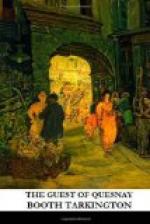“It is true—it did not.” He ran his huge hand through the heavy white waves of his hair, and shook his head vigorously. “No; I knew it, my dear sir, I knew it well. But, what could I do? I would not have telled my own mother! This much I can say to you: we came here at a risk, but I thought that with great care it might be made little. And I thought a great good thing might be accomplish if we should come here, something so fine, so wonderful, that even if the danger had been great I would have risked it. I will tell you a little more: I think that great thing is being accomplish!” Here he rose to his feet excitedly and began to pace the room as he talked, the ancient floor shaking with his tread. “I think it is done! And ha! my dear sir, if it should be, this big Keredec will not have lived in vain! It was a great task I undertake with my young man, and the glory to see it finish is almost here. Even if the danger should come, the thing is done, for all that is real and has true meaning is inside the soul!”
“It was in connection with the risk you have mentioned that I came to talk,” I returned with some emphasis, for I was convinced of the reality of Mr. Earl Percy and also very certain that he had no existence inside or outside a soul. “I think it necessary that you should know—”
But the professor was launched. I might as well have swept the rising tide with a broom. He talked with magnificent vehemence for twenty minutes, his theme being some theory of his own that the individuality of a soul is immortal, and that even in perfection, the soul cannot possibly merge into any Nirvana. Meantime, I wondered how Mr. Percy was employing his time, but after one or two ineffectual attempts to interrupt, I gave myself to silence until the oration should be concluded.
“And so it is with my boy,” he proclaimed, coming at last to the case in hand. “The spirit of him, the real Oliver Saffren, that has never change! The outside of him, those thing that belong to him, like his memory, they have change, but not himself, for himself is eternal and unchangeable. I have taught him, yes; I have helped him get the small things we can add to our possession—a little knowledge, maybe, a little power of judgment. But, my dear sir, I tell you that such things are only possessions of a man. They are not the man! All that a man is or ever shall be, he is when he is a baby. So with Oliver; he had lived a little while, twenty-six years, perhaps, when pft—like that!—he became almost as a baby again. He could remember how to talk, but not much more. He had lost his belongings—they were gone from the lobe of the brain where he had stored them; but he was not gone, no part of the real himself was lacking. Then presently they send him to me to make new his belongings, to restore his possessions. Ha, what a task! To take him with nothing in




